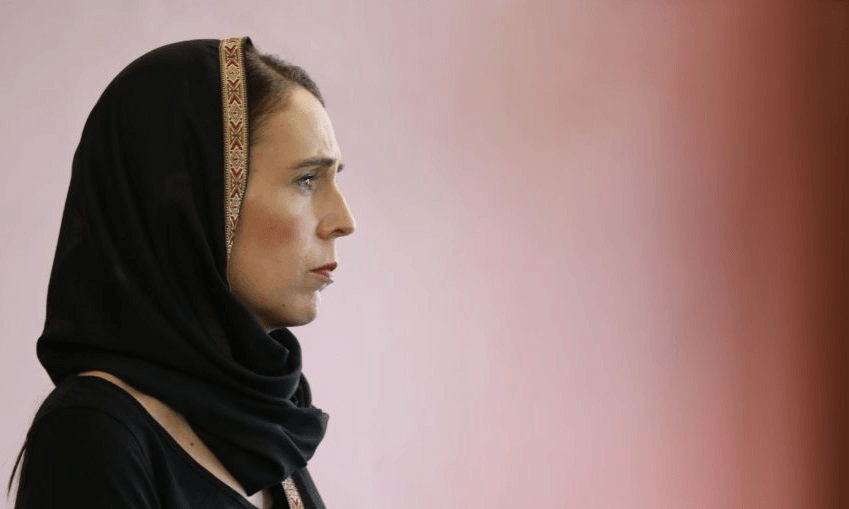A 28 year old man was charged with murder after an unprecedented terror attack in a city still patching itself together. Madeleine Chapman reports from Christchurch
She had made the coffee strong because she figured the police officers stationed at the end of her street didn’t sleep much last night. She was right. Two hours, was the estimate given by a man in a bulletproof vest. A Brockworth Place resident, she was handing containers of paper cups and coffee to the officers patrolling the cordon around the Masjid Al Noor mosque where at least 41 people were murdered on Friday afternoon. The woman was home at the time, caring for a number of children. She asked not to be named.
“We heard it all. It was just over that fence, a couple of hundred metres. We hunkered down, closed the curtains, and put on the TV.”
Having handed over the coffee pot and sugar, the woman and her daughter left the police officers on duty and promised to return with refills. She nodded at her daughter. “She’s cooking up some brownies.” Her daughter mentioned her friends have been taking baking around to hospitals and other community areas, but she thought she might as well cater to those on her own street. They sounded like staples in the community. I asked how long they’ve lived on Brockworth Place.
The woman smiled. “Six weeks.”
Over her shoulder, a pile of flowers laid beneath a tree just outside the cordon. In the same line of sight, a police officer readjusted the grip on her gun.
This is New Zealand’s ground zero. Across 36 minutes on Friday, a man unleashed a bloody, racist act of terror across two Christchurch mosques, Al Noor and Linwood. Forty-nine men and women were killed, most at worship. At least one child, a five-year-old girl, is dead. Another 11 people are in intensive care.
The crime reverberates through the country and the world. Vigils have been held from Auckland to London. Police have announced they will continue to provide security to mosques around the country. The man who stands accused was not on any security services’ watchlist in New Zealand or Australia. New Zealand Muslims have said: we know intelligence services were focused on extremism at our mosques, but where was the scrutiny of those set upon attacking us?
The government has already announced that stricter gun control laws will be enacted. “I can tell you one thing,” said Jacinda Ardern from parliament this morning before flying on a Defence Force plane to Christchurch. “Our gun laws will change.”
There are still bodies in the Al Noor mosque. The cordon was pushed out earlier today to prevent bystanders from viewing the crime scene. The prime minister this afternoon said Police hoped “they will have all bodies removed by the end of the day”.
The mosque stands opposite Christchurch’s Hagley Park. On the other side of the park is the Botanical Gardens, where Mayor Lianne Dalziel has encouraged mourners to leave flowers. Dozens of locals at a time lined the footpath this morning, either placing flowers along the garden wall or simply looking.
A middle aged man in sunglasses stood frozen still. He looked distracted, hurriedly wiped his cheek, adjusted his glasses, and walked back to his car.
On the grass near the flowers, Catherine had set up a picnic blanket with art supplies. She was crocheting hearts while two young men left messages of condolence and love on pieces of card. Catherine had intended to visit the mosque but had been directed to the gardens by police. “Any response feels so small but I just wanted to create a space where people could express their sadness, solidarity, grief.”
The makeshift shrine has grown through the day. Small cards were scattered together with the flowers, messages written in chalk along the footpath. “I kind of thought it would be mostly kids joining in but it’s been everyone. Adults, teenagers writing messages of support and love. It’s just nice to be together.”
Another woman, Francesca, walked by to drop off some lilies. She’d been out running errands but felt she had to do something. “I didn’t know how else to show my sympathy for what happened.” Francesca was one of hundreds, perhaps thousands, sharing the same sentiment. Around the cordons and the garden wall, Christchurch was piercingly quiet today. A city so used to rebuilding, but now reeling from a different kind of catastrophe: there are no bricks to pick up or trenches to dig.
While thousands of New Zealanders paid tribute around the country this morning to the victims of Friday’s terror attack and the Muslim community more broadly, a mere smattering gathered outside Christchurch District Court hoping to see the man alleged to have killed so many.
Inside the courtroom, the man’s lawyer informed Judge Kellar that the accused would not be seeking name suppression. He would not be seeking bail. Standing in the dock, charged with murder, the accused’s eyes roamed around the room, vacant, as if he couldn’t process what was being said. He occasionally glanced towards the media in the gallery, his hands cuffed and clasped together tightly. A high court date was set for April 5 and, within five minutes of entering the courtroom, he was gone.
When later asked how she felt about possibly being in the same building as the man who allegedly carried out this attack, Jacinda Ardern said, “I’m also in the same building as the people who are bringing him to justice”.
Outside, media mingled around, hoping to catch a glimpse of the man as he was being driven away. A few members of the public loitered, smoking cigarettes, before seemingly losing interest and leaving.
Two blocks down, crowds were gathering all around Hagley Park, playing music, and paying tribute.



